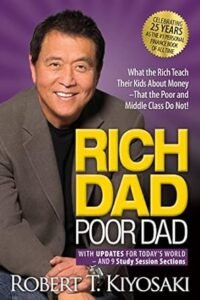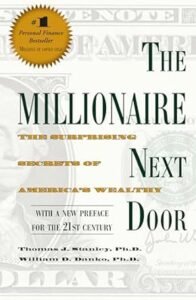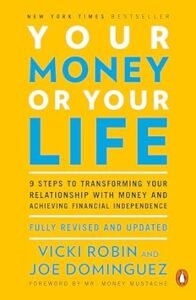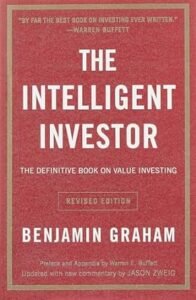5 Must-Read Money Books to Secure Your Financial Future.
Understanding money is one of the most important skills you can develop in life. Whether you want to get out of debt, start investing, or manage your finances better, reading the right books can provide valuable insights and strategies. In this blog, we’ll explore five essential money-related books that can guide you toward financial success. Each book offers unique lessons, and by the end of this article, you’ll have a clear understanding of why these books are must-reads and how they can help you achieve your financial goals.
1) “Rich Dad Poor Dad” by Robert T. Kiyosaki

Why You Should Read It:
“Rich Dad Poor Dad” is a transformative book that changes how you think about money and wealth. Robert Kiyosaki shares the lessons he learned from two influential father figures in his life: his own father (whom he calls the “Poor Dad”) and his best friend’s father (the “Rich Dad”). This book is perfect for anyone who wants to understand the mindset that separates the wealthy from the rest.
Key Takeaways:
- The Importance of Financial Education: One of the central themes of “Rich Dad Poor Dad” is the value of financial education. Kiyosaki argues that traditional education systems don’t teach us how to manage money, invest, or build wealth. Instead, he emphasizes the need to seek financial knowledge independently.
- Assets vs. Liabilities: Kiyosaki introduces the concept of assets and liabilities, explaining that true wealth is built by acquiring assets (things that put money in your pocket) and minimizing liabilities (things that take money out of your pocket). Understanding this distinction is crucial for anyone looking to build financial stability.
- The Power of Entrepreneurship: Kiyosaki’s “Rich Dad” encourages thinking like an entrepreneur, seeing opportunities where others see challenges. He teaches that starting a business or investing in income-generating assets is a key strategy for building wealth.
- Overcoming Fear: The book also tackles the emotional aspects of money, such as fear and greed. Kiyosaki discusses how these emotions can prevent people from taking risks that could lead to financial growth and how overcoming these fears is essential for success.
- Working for Knowledge, Not Just Money: Kiyosaki advises that when choosing a job or career path, it’s essential to consider the skills and knowledge you’ll gain, not just the salary. This approach can lead to greater opportunities and long-term financial benefits.
In-Depth Analysis:
“Rich Dad Poor Dad” is more than just a book about money; it’s about mindset. Kiyosaki’s contrasting experiences with his two “dads” highlight how different approaches to money can lead to vastly different outcomes in life. His “Poor Dad” represents the traditional approach to money—get a good education, work hard, and climb the corporate ladder. While this path offers stability, it often doesn’t lead to significant wealth. On the other hand, his “Rich Dad” focuses on financial independence, entrepreneurship, and investing in assets that generate income. This approach, while riskier, is presented as the path to true wealth and economic freedom.
For young adults just starting their financial journey or looking to break the paycheck-to-paycheck cycle, “Rich Dad Poor Dad” offers a new perspective that can inspire change. It encourages readers to take control of their financial future by seeking education, making smart investments, and thinking like an entrepreneur.
2) “The Total Money Makeover” by Dave Ramsey

Why You Should Read It:
If you’re struggling with debt or looking to take control of your finances, “The Total Money Makeover” is a straightforward, no-nonsense guide to achieving financial freedom. Dave Ramsey’s approach is practical and easy to follow, making it a great choice for anyone, regardless of their current financial situation.
Key Takeaways:
- Creating a Budget: Ramsey emphasizes the importance of living on a budget. He provides simple, actionable steps to create a budget that works for you, allowing you to track your spending and make sure you’re living within your means.
- The Debt Snowball Method: One of the most popular concepts in the book is the “Debt Snowball” method. Ramsey advises paying off your smallest debts first, gaining momentum as you go, and then tackling larger debts. This method is psychologically motivating and helps build confidence as you see your debts disappear.
- Building an Emergency Fund: Ramsey stresses the importance of an emergency fund covering unexpected expenses. He recommends starting with a small emergency fund (e.g., $1,000) and then building it up to cover three to six months of expenses once your debts are paid off.
- Planning for Retirement: The book also provides advice on retirement savings, including tips on investing in tax-advantaged accounts like 401(k)s and IRAs. Ramsey advocates for consistent, disciplined investing to build wealth over time.
- Avoiding Common Pitfalls: Ramsey highlights common financial mistakes that people make, such as relying on credit cards or taking on too much debt. He offers practical advice on how to avoid these pitfalls and make smarter financial decisions.
In-Depth Analysis:
“The Total Money Makeover” is about controlling your financial life. Ramsey’s approach is refreshingly straightforward—there’s no complicated jargon or obscure financial theories here, just simple, practical advice anyone can follow. The book’s step-by-step plan for getting out of debt is particularly helpful for those who feel overwhelmed by their financial situation. By focusing on one debt at a time, Ramsey’s method allows you to see real progress quickly, which can be incredibly motivating.
One of the book’s strengths is its emphasis on behavior change. Ramsey understands that managing money is as much about psychology as math. His advice to pay off the smallest debts first, for example, isn’t the most mathematically efficient way to get out of debt, but it’s designed to build confidence and create positive momentum. This focus on changing your habits and mindset around money makes “The Total Money Makeover” such a powerful tool for achieving financial success.
For anyone looking to take control of their finances, get out of debt, and build a secure financial future, “The Total Money Makeover” is an invaluable resource. It’s particularly useful for those who need a clear, easy-to-follow plan to get their finances back on track.
3) “The Millionaire Next Door”

Why You Should Read It:
“The Millionaire Next Door” offers a surprising look at how ordinary people can build extraordinary wealth. Through extensive research, authors Thomas Stanley and William Danko reveal that most millionaires are not flashy, high-earning individuals living in expensive homes; instead, they are often modest, frugal, and disciplined with their money. This book is perfect for anyone who wants to understand the habits and behaviors that lead to true financial success.
Key Takeaways:
- Living Below Your Means: One of the book’s central themes is that many millionaires live below their means. They focus on saving and investing rather than spending on luxury items. This frugality is a key factor in their wealth accumulation.
- The Importance of Budgeting: The authors emphasize that budgeting and careful financial planning are crucial for building wealth. Most millionaires meticulously track their spending and stick to a budget.
- Investing Wisely: “The Millionaire Next Door” shows that most millionaires invest their money in stable, long-term assets like stocks, bonds, and real estate. They avoid risky investments and focus on building wealth steadily over time.
- Avoiding Lifestyle Inflation: The book highlights how many millionaires resist the temptation to upgrade their lifestyle as their income grows. Instead of buying bigger houses or more expensive cars, they continue to live modestly and invest the difference.
- Independence Over Income: The authors argue that being financially independent is more important than having a high income. Many millionaires are self-employed or own small businesses, which gives them control over their financial future.
In-Depth Analysis:
“The Millionaire Next Door” is a fascinating exploration of what it really takes to build wealth. The book debunks many myths about millionaires, showing that most are not high-flying executives or celebrities but ordinary people who have made smart financial choices. The research conducted by Stanley and Danko reveals that many millionaires have more in common with the average person than with the stereotypical image of the wealthy.
One of the most striking findings in the book is the emphasis on frugality. Many millionaires interviewed live in modest homes, drive used cars, and rarely spend money on luxury items. This contrasts sharply with the image of wealth portrayed in the media, where success is often equated with lavish spending. “The Millionaire Next Door” clarifies that wealth is not about how much you earn but how much you keep and invest.
The book also highlights the importance of discipline and long-term planning. Building wealth is not about getting rich quickly; it’s about making consistent, smart financial decisions over a lifetime. For anyone who wants to build wealth, “The Millionaire Next Door” offers valuable lessons on the importance of living below your means, avoiding lifestyle inflation, and investing wisely.
4) Your Money or Your Life” by Vicki Robin

Why You Should Read It:
“Your Money or Your Life” offers a holistic approach to personal finance, emphasizing the relationship between money, time, and overall life satisfaction. Vicki Robin and Joe Dominguez provide a step-by-step program to help you transform your relationship with money and achieve financial independence. This book is a must-read for anyone looking to live a more meaningful, purpose-driven life.
Key Takeaways:
- Understanding Life Energy: The authors introduce the concept of “life energy,” which represents the time and effort you spend earning money. They encourage you to consider how much life energy each purchase costs you and whether it’s worth it.
- Aligning Spending with Values: The book emphasizes the importance of tracking your spending and ensuring that it aligns with your values and life goals. By doing so, you can reduce unnecessary expenses and focus on what truly matters.
- Achieving Financial Independence: Robin and Dominguez provide a roadmap to financial independence, which involves reducing expenses, increasing savings, and investing in low-risk, income-generating assets.
- Finding Purpose: The book encourages readers to rethink their relationship with work and money, focusing on finding purpose and fulfillment rather than just accumulating wealth.
- The Crossover Point: One of the key concepts in the book is the “Crossover Point,” where your passive income from investments covers your living expenses, allowing you to achieve financial independence.
In-Depth Analysis:
“Your Money or Your Life” is a powerful book that challenges conventional wisdom about money and success. Instead of focusing solely on earning and spending, Robin and Dominguez encourage readers to think deeply about money’s role in their lives. The concept of “life energy” is particularly thought-provoking, as it forces you to consider the true cost of your purchases regarding the time and effort you put into earning money.
The book’s emphasis on aligning spending with values is also refreshing. In a world where consumerism often drives people to spend more than they need, “Your Money or Your Life” offers a different perspective—one that prioritizes meaning and purpose over material possessions. By tracking your spending and focusing on what truly matters, you can reduce financial stress and live a more fulfilling life.
Another strength of the book is its focus on financial independence. Robin and Dominguez provide practical advice on reducing expenses, increasing savings, and investing in ways that generate passive income. The ultimate goal is to reach the “Crossover Point,” where your investments generate enough income to cover your living expenses, allowing you to live life on your terms.
For anyone looking to transform their relationship with money and achieve financial independence, “Your Money or Your Life” is an essential read. It’s particularly valuable for those who want to live a more intentional, purpose-driven life.
5) “The Intelligent Investor” by Benjamin Graham

Why You Should Read It:
“The Intelligent Investor” is a classic guide to investing, offering timeless wisdom on approaching the stock market. Written by Benjamin Graham, one of the greatest investment advisors of the 20th century, this book provides valuable insights for anyone looking to grow their wealth through smart, disciplined investing.
Key Takeaways:
- Value Investing: Graham is known as the father of value investing, a strategy that involves buying undervalued stocks and holding them for the long term. The book teaches you how to evaluate stocks and identify those that are trading below their intrinsic value.
- Margin of Safety: One of the key concepts in the book is the “margin of safety,” which refers to the difference between a stock’s market price and its intrinsic value. Graham advises investing in stocks with a wide margin of safety to reduce risk and protect your investments.
- The Difference Between Investing and Speculating: Graham distinguishes between investing, which involves careful analysis and a long-term perspective, and speculating, which is more akin to gambling on short-term market movements. He advocates for a disciplined, research-based approach to investing.
- Avoiding Emotional Decisions: The book emphasizes the importance of avoiding emotional decision-making in investing. Graham teaches you how to stay calm and focused, even in volatile markets, and to base your decisions on sound analysis rather than market hype.
- The Defensive vs. Enterprising Investor: Graham categorizes investors into two types: defensive and enterprising. Defensive investors prioritize safety and a steady return, while enterprising investors are willing to take on more risk in pursuit of higher returns. The book provides advice tailored to both types of investors.
In-Depth Analysis:
“The Intelligent Investor” is widely regarded as one of the best investment books ever written. Its influence can be seen in the strategies of many successful investors, including Warren Buffett, who has described it as “by far the best book on investing ever written.” The book’s central philosophy—value investing—has stood the test of time and continues to be a popular strategy among investors.
One of the book’s strengths is its focus on reducing risk through the concept of the margin of safety. Graham argues that investing in undervalued stocks can protect yourself from market downturns and increase your chances of long-term success. This conservative approach to investing is particularly appealing to those who are risk-averse or new to the stock market.
Another key lesson from the book is the importance of separating investing from speculating. Graham warns against trying to time the market or chasing after the latest trends. Instead, he advocates for a disciplined, research-based approach to investing, where decisions are based on careful analysis rather than emotion.
“The Intelligent Investor” is also notable for its practical advice on how to manage your portfolio. Graham’s distinction between defensive and enterprising investors is particularly helpful, as it allows readers to tailor their investment strategy to their own risk tolerance and financial goals.
“The Intelligent Investor” is a must-read for anyone interested in investing. It offers timeless wisdom on approaching the stock market with discipline and intelligence, helping you grow your wealth while minimizing risk.
Conclusion
These five books offer essential insights into managing money, building wealth, and achieving financial success. Whether you’re just starting out or looking to refine your financial strategies, these readings will give you the knowledge and tools you need to take control of your financial future. From understanding the mindset of the wealthy in “Rich Dad Poor Dad” to learning the intricacies of value investing in “The Intelligent Investor,” each book offers valuable lessons that can help you on your journey to financial independence.
By reading and applying the lessons from these books, you can build a strong foundation for your financial future. Whether you’re looking to get out of debt, invest wisely, or simply understand money better, these books will guide you every step of the way. Take the first step towards financial success today by diving into these must-read money books.





